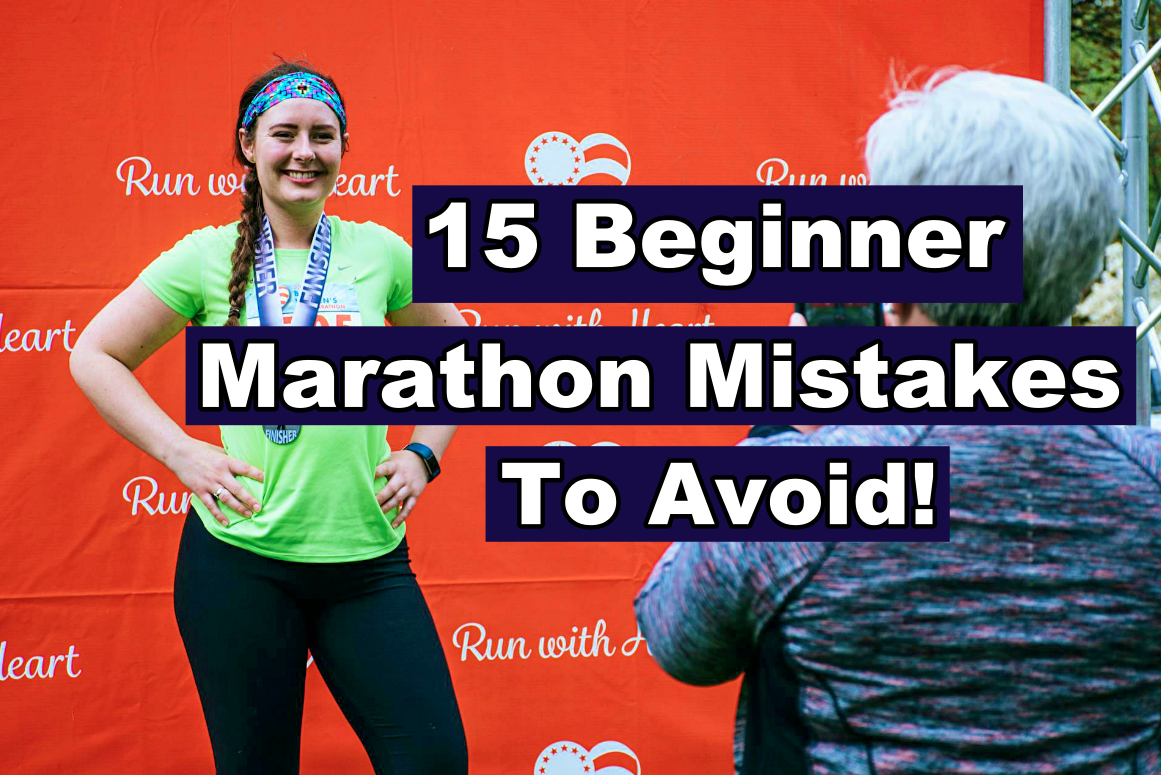Honestly, my first marathon wasn’t the perfect one. It was messy, painful, and filled with more mistakes than I care to admit. Training for your first marathon is an exciting journey, but it’s easy to make Beginner Marathon Mistakes that can hamper your progress.
Avoiding these mistakes will help you train smarter, stay injury-free, and cross the finish line feeling strong and proud. I’m sharing my lesson learned to help you avoid the 15 Common Beginner Marathon Mistakes:
Table of Contents
1. Skipping Rest Days: Why Recovery is Key?
Rest days are not optional. they’re paramount. When you train hard, your muscles develop tiny tears, and rest is when they rebuild stronger. Many beginners think pushing harder makes them faster. But that is not true. Overtraining without rest can lead to injuries like shin splints or tendonitis. Make rest days guarded, and don’t feel guilty about taking them. Use these days to stretch, hydrate, or even treat yourself to a massage.
2. Starting Too Fast: Slow and Steady Wins the Race!
The excitement of race day often causes beginners to start at an unsustainable pace. Picture this: You’re feeling great at mile 5, but by mile 20, you’re walking. The key is to start slower than you think you need to. Use your long training runs to practice pacing. On race day, stick to a strategy. Especially, for the first half of the race, to preserve energy for the later miles.
3. Ignoring a Structured Training Plan
A good marathon training plan is like a map to the finish line. Without one, you risk running too little, too much, or inconsistently. Structured plans gradually build mileage, mix in speed workouts, and prioritise rest days. Beginners often benefit from plans that start with three to four runs per week. Choose a program suited to your fitness level and adjust if needed.
4. Neglecting Long Runs
Long runs are your secret weapon. They prepare your body and mind for the endurance required to complete 26.2 miles. Skipping or cutting them short can leave you unprepared. Plan these runs for weekends when you have more time. Gradually increase the distance, aiming for a peak long run of 18-22 miles. These runs teach you about pacing, nutrition, and the mental toughness needed on race day.
5. Poor Hydration and Nutrition Practices

Hydration and fueling are as important as training itself. Many beginners underestimate how much their bodies need during long runs. Dehydration can lead to cramps, while improper fueling can cause energy crashes. Experiment with water, electrolyte drinks, and energy gels during training to see what works best for your body. Don’t wait until race day to try something new!
6. Wearing New Gear on Race Day
New gear might seem exciting, but race day is not the time for experiments. Brand-new shoes can cause blisters, and untested clothing might scratch your skin. Stick with the gear you’ve used in training. Make sure to break your new shoes well before the race. Apply anti-friction products such as Vaseline to avoid painful surprises.
7. Overtraining: Danger of Doing Too Much!
Marathon training is a marathon in itself, not a sprint. Many beginners fall into the trap of overtraining, thinking more miles will deliver better results. This can lead to fatigue, burnout, or injury. Follow the 10% rule: increase your weekly mileage by no more than 10% to give your body time to adapt. Listen to your body, rest when you need it.
8. Undertraining: Don’t Skip the Hard Work!
On the flip side, undertraining can be just as harmful. Skipping long runs or not building up mileage leaves you underprepared for race day. Commit to your training schedule and treat long runs as non-negotiable. If life gets busy, prioritise consistency over perfection. It is better to do a shorter run than skip entirely.
9. Failing to Taper: The Importance of Easing Up!
Tapering is the final stage of marathon training, where you reduce mileage in the last 2-4 weeks before the race. Beginners often feel anxious during this time, mistaking reduced mileage for slacking off. However, tapering allows your muscles to recover and your energy to peak. Trust the process and use this time to focus on mental preparation.
10. Skipping Strength Training

Marathon running isn’t just about running. Incorporating strength training builds muscle stability and prevents injuries. Cross-training activities like swimming or cycling improve cardiovascular fitness while giving your joints a break from impact. Schedule 1-2 sessions of strength or cross-training each week to complement your running.
11. Ignoring Warning Signs: Pain Isn’t Always Gain!
A little soreness is normal, but sharp pain is not. Beginners often ignore early warning signs, hoping they’ll go away. Whether it’s a niggling knee pain or a persistent ache, address it early. Rest, ice, or consult a physiotherapist. Remember, it’s better to take a few days off now than weeks later, due to a serious injury.
12. Starting Your Training Too Late
Many beginners underestimate how long it takes to prepare for a marathon. A typical plan spans 12-20 weeks, allowing your body to adapt gradually. Starting late often leads to overtraining and injury. Plan your marathon for at least 3 to 5 months to give yourself enough time for a proper buildup. You can check out my Free 12-week Marathon Training Plan for Beginners in PDF.
13. Overlooking Mental Preparation: Train Your Mind!
Marathons test your mind as much as your body. In the long run, mental resilience is built, but visualisation and positive commitments can also help. Imagine yourself crossing the finish line or staying strong during tough moments. Break the distance into smaller segments to make it feel more manageable.
14. Not Accounting for Weather Conditions
Marathon day weather can be unpredictable. Train in various conditions so you’re prepared for heat, rain, or wind. Dress appropriately for the weather on race day and adjust your hydration and pacing strategies accordingly.
15. Setting Unrealistic Goals
Your first marathon goal should be simple, finish strong and enjoy the experience. Unrealistic time goals can lead to disappointment or burnout. Set your expectations on your training progress, not what others are doing.
Extra Tips to Avoid Beginner Marathon Mistakes!
With my personal experience, I strongly suggest you to consider below as well during your training:
Skipping Warm-Ups and Cool-Downs
Warmups prepare your muscles for activity, reducing injury risk, while cool-downs help recovery. Don’t rush through these essential steps in your training or on race day.
Overloading Your Training Plan
Balancing marathon training with work and life can be challenging. Avoid overcommitting to social or professional commitments during your training cycle. Make rest, recovery, and proper sleep a priority.
Overthinking the Process
It’s easy to overanalyse every aspect of training and race day. Focus on consistency rather than perfection. Trust the work you’ve put in and approach race day with confidence.
Bonus Tips for Marathon Success!
Here are some bonus tips for you to be successful in your Marathon Journey:
Stay Consistent
Consistency is the secret sauce of marathon training. Even if you miss a day, get back on track rather than squeezing extra miles later.
Practice Race Nutrition
Experiment with mid-run fueling to avoid hitting the wall. Find the right balance of carbs and electrolytes that works for you.
Join The Club
Join a local running group or find a training buddy. Having support keeps you accountable and makes training more enjoyable. Strava is a great app for finding new running friends and discovering training routes in your local area.
Summing Up: Learn From Common Marathon Mistakes!
Marathon training is a rollercoaster of emotions, physical challenges, and personal discovery. But avoiding these Beginner Marathon Mistakes can make it smoother and more enjoyable, and remember; every step is a step closer to becoming a marathoner.
Happy running!




